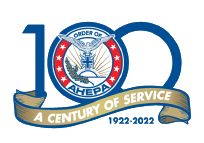History of the Order of AHEPA
AHEPA Socratic / Socrates Award
The Socratic Award – now referred to the Order of AHEPA Socrates Award – is the highest award the Order of AHEPA bestows. The award is given every two years.
The AHEPA Socratic Award Sculpture & Scroll
The bust done in bronze presented – symbolic of the Ahepa Socratic Award – is 3/4 life size of the ancient Greek philosopher Socrates and mounted on a marble base. Sculptor Felix W. de Weldon creator of of the Iwo Jima Marine Corps Memorial and many other monuments and statues through out the world, including the AHEPA Truman Statue in Athens, did this bust of Socrates. The likeness of Socrates is based on the bust of Socrates which is in Pentelikon marble and which was done during his lifetime in ancient Athens.
The Ahepa Socratic Award is also accompanied by a scroll.
Henry R. Luce - Initial Recipient of the Socratic Award
The first recipient in 1964 was Henry R. Luce, publisher of Time and Life magazines. He was cited for Life magazine's 1963 series, "the Miracle of Greece."
The 1964 Ahepa National Banquet honoring the U.S. Congress was held on March 16, 1964, and featured the first and initial presentation of the new Ahepa Socratic Award to Henry R. Luce, Editorial Chairman of LIFE and TIME Magazines, in appreciation and recognition of the series of articles published in LIFE Magazine in 1963 entitled "The Miracle of Greece." The articles depicted the contributions of Ancient Greece to modern civilization and the Western World, and it was for this dissemination of Hellenic culture and Hellenic ideals to the peoples of the world, that Ahepa made this award to Mr. Luce.
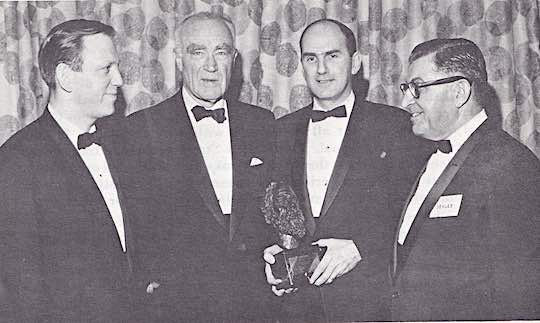
1964 - AHEPA Socratic Award
Henry R. Luce, (second from left) publisher of TIME and LIFE, was the first recipient of the Ahepa Socratic
Award on March 16, 1964. Also shown: United States Congressman John Brademas, Supreme President John G. Plumides, Supreme Trustees Chairman Socrates V. Sekles
AHEPA Socratic Award Scroll Presented to Henry R. Luce
The Ahepa Socratic Award is also accompanied by a scroll. The Scroll that was presented to Henry R. Luce, accompanying the Socratic Award, reads as follows:
The Order of Ahepa 1964 Socratic Award, presented to Henry R. Luce, editor in chief, Life magazine, for contributions and services in the dissemination of Hellenic culture and Hellenic ideals to the peoples of the world through the pages of Life magazine. The series of articles entitled "The Miracle of Greece" which appeared in Life magazine in 1963, notably recounted in words and pictures the achievement of a handful of people called Greeks who aroused the human race to a new ambition and sense of purpose. The contributions of ancient Greece to all of us, to our world of today, is an achievement so great that it touches almost every phase of our lives. Hellenic culture and ideals have not only encompassed practically all facets of life in today's modern world, but brought forth one great thought, so novel and profound that a whole new age dawned in its light. As stated in "The Mir acle of Greece" this great thought was that man's nature, even in its mortality, is the glory of creation and that man has a noble purpose to live at the highest possible pitch of human performance, physically, morally, and intellectually. One of the major objects and purposes of the Order of Ahepa is the dissemination of Hellenic culture and ideals through education and practice. It is with grateful appreciation, therefore, that the fraternity does herewith present to Mr. Henry R. Luce the Ahepa Socratic Award for 1964, represented by this scroll and award itself, a bronze bust of the ancient Greek philosopher Socrates.
Done in the city of Washington, D.C. this 16th day of March 1964
– John G. Plumides, Supreme President.
Luce gave one of the most eloquent addresses ever delivered at an AHEPA Banquet.
It has been a wonderful experience for me to be here this evening, not simply because I am the very happy recipient of a great award (the Ahepa Socratic Award ) – no award has ever made me happier – but simply to have this experience of being with the Greeks. There is a saying that we are all Greeks. All those who have been touched a little bit by the process of civilization are all Greeks. There is a great vitality and a great love of liberty among the Greeks, as evidenced by the feelings that have been expressed here tonight.
I thank you, therefore, for the great privilege of this personal experience.
I can quite simply say that I have never received any honor which has appealed so much not only to my vanity and pride, but to my heart. This series on Greece, "The Miracle of Greece," was, in fact, a work of love. It was the work of any hands.
The greatest thrill for an editor is to be seized with a great and noble theme, and to be able to develop this theme in such manner that millions of people will be able to enjoy it and learn from it. There was, as AHEPA Supreme President John G. Plumides has so generously remarked, a complete response from the wide American public to this series, and this was the greatest satisfaction that can come to us who work in the journalistic, editorial field. To have this labor of love give such satisfaction in response and results, and then to be crowned with the Ahepa Socratic Award, leaves me almost speechless with gratitude for the whole great experience.
In the 20th century we have a little feeling of what it must have been like in the time of Pericles. The challenge is to create an American civilization based on the idea of Greece – the expansion of knowledge, music, culture, and universities.
For 200 years, the American people have been faithful to one dominant purpose, namely to the establishment of a form of government. That purpose has now been fulfilled, and we are at present seized by a broader challenge, namely, the shaping of civilization. We will meet that challenge too. We will succeed in creating the first modern, technological, prosperous, humane and reverent civilization – 2,500 years after Pericles.
Pursue excellence rather than mediocrity – that is what the Greek community is saying to us. This message from all over the country has a greater relevance today than ever before. We are all Greeks because we are all touched with civilization. Let us all, as Americans, emulate the Greeks.
In its editorial page, LIFE Magazine Managing Editor George P. Hunt wrote:
The Thrill of Being 'Seized with Themes'
Match 27, 1964 EDITORS' NOTE – LIFE Magazine
"The greatest thrill for an editor is to be seized with a great theme." Speaking in Washington last week to a gathering of a thousand Americans of Greek descent. Editor-in-Chief Henry R. Luce was referring to LIFE's 1963 series -- The Miracle of Greece. For the series, Luce was presented the first Socratic award from the Order of Ahepa -- the American Hellenic Educational Progressive Association -- which was founded in 1922 to educate in the English language and the American way the thousands of Greeks who emigrated to the U.S. after World War I and the Turkish invasion of 1922. Supreme president of the order, John G. Plumides, made the presentation to a standing ovation of the men of Ahepa and members or its auxiliaries – the Daughters or Penelope, the Sons of Pericles and the Maids of Athena.
"In the 20th Century," Luce ended his acceptance speech. "we have a little bit of the feeling of what it must have been like in the time of Pericles. The challenge is to create an American civilization based on the idea of Greece -- the expansion of knowledge, music, culture. universities. For 200 years the American people have been faithful to one dominant purpose, namely, to the establishment or a form of government. That purpose has now been fulfilled, and we are at present seized by a broader challenge, namely. the shaping or a civilization. We will meet that broader challenge, too. We will succceed in creating the first modern, technological, prosperous, humane and reverent civilization -- 2,500 years after Pericles. Pursue excellence rather than mediocrity -- that is what the Greek community is saying to us today.
George P. Hunt
Managing Editor
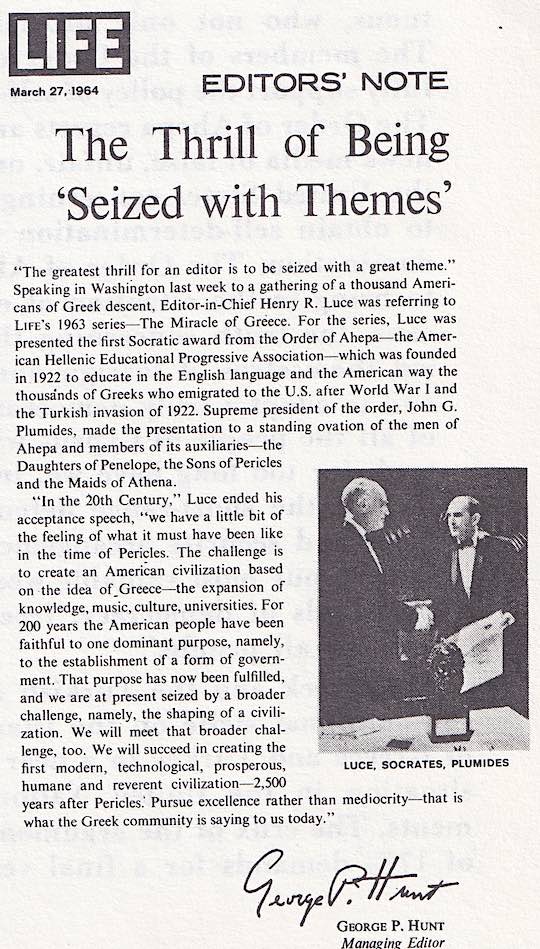
The Thrill of Being 'Seized with Themes'
President Lyndon B. Johnson - 1966
President Lyndon Johnson received the 1966 Socrates Award at the 17th National Banquet in honor of the 89th Congress. The award was accepted on behalf of President Johnson by Mike Manatos, Administrative Assistant to the President.
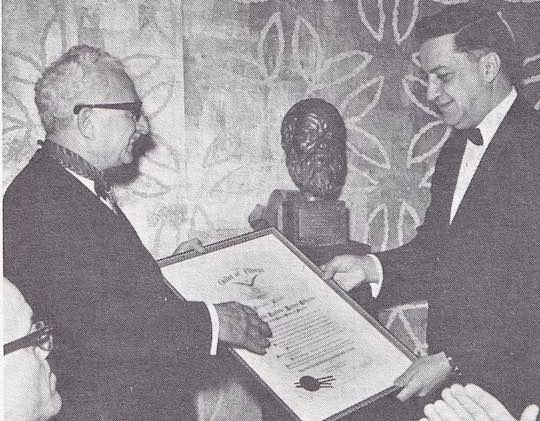
1966 - AHEPA Socratic Award
President Lyndon B. Johnson was the recipient of the 1966 award, received in his behalf by his Administrative Assistant, Ahepan Mike N. Manatos (right). Supreme President Kimon A. Doukas makes the presentation
In his message to the AHEPA dinner, President Johnson stated:
"In honoring the 89th Congress, the members of the Order of AHEPA are extending well-deserved tribute. And as you acknowledge America's debt of gratitude to her forward-looking legislators, I want to acknowledge my appreciation for your alert and responsible membership. The laws of any progressive government must be formed and directed to improve the life and objectives of all of its citizens. They must be designed to assure equal opportunity for personal achievement – and they must stimulate the development of each mans' talents to their fullest capacities. Ancient Greece recognized these foremost principles of a democratic society, and Americans in 1966 sustain the legacy of your forefathers. As an American society dedicated to these principles, the Order of AHEPA has adhered to the highest tradition of democratic citizenship."
Senator Everett Dirksen - 1968
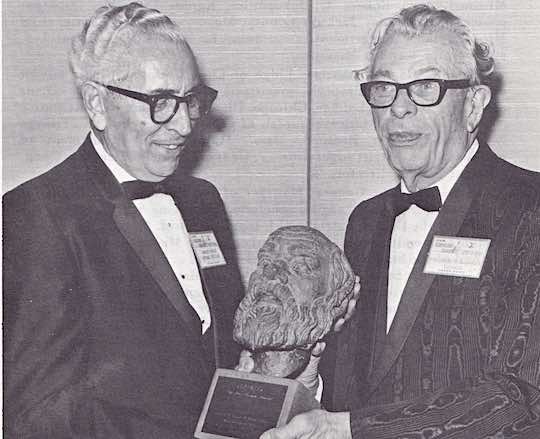
1968 AHEPA Socratic Award - Senator Everett M. Dirksen
United States Senator Everett M. Dirksen (right) is the recipient of the 1968 Ahepa Socratic Award, being
presented by Supreme President Andrew Fasseas.
On March 18, 1968 Senator Everett Dirksen, the United States Senate Minority Leader, received the 1968 Socrates Award at the 18th National Banquet. Senator Everett M. Dirksen of Illinois was the recipient of the AhHEPA Socratic Award for his public services to his city, state, and country.
In presenting the Socrates Award to Senator Dirksen, Supreme President Andrew Fasseas said:
"Senator Dirksen, an active member of AHEPA for thirty years, symbolizes what Socrates stood for. When one gives of oneself, one truly gives. He has dedicated his life not only to the people of Illinois, but the people of the world. He is our second Lincoln."
Senator Dirksen said as he accepted the award that Socrates was "one of the greatest minds that ever lived in the history of mankind." He also said that Socrates "embodied the very best in the Greek mind. First its clarity that somehow made manifest to his pupils the principles by which they had to live; and then his moral concern for his own society in his day and time. He always went about saying, 'Know thyself,' because that's where wisdom begins. When people know themselves, everything will be added unto it. And that was the greatness of it. But, you see, he was brilliant in life and perhaps even more brilliant and greater in death."
Senator Dirksen, in conclusion said he was honored and deeply grateful to receive the Socrates Award, which he said, "shall have a place of honor, and whenever I look at it, always and always it will be a reminder of those amazing truths that must be discovered and rediscovered in the interest of a free society and a stable civilization."
Vice President Spiro T. Agnew - 1970
Vice President Spiro T. Agnew was the recipient of the 1970 Ahepa Socratic Award at the 19th AHEPA National Banquet in Washington, D.C. at the Sheraton Park Hotel on March 9, 1970. More than 1,400 persons jammed the banquet hall, making this the largest AHEPA National Banquet of all time. Vice President Agnew was the principal speaker of the evening. Other major speakers included United States Senator Philip A. Hart of Michigan, United States Representative Gerald R. Ford of Michigan, and Supreme President Manesiotis.
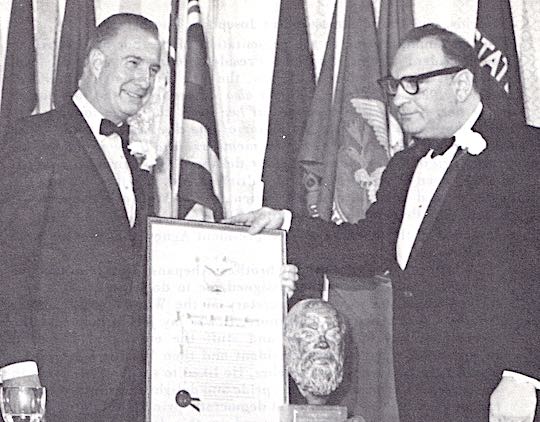
1970 AHEPA Socratic Award - Vice President Agnew
Vice President Spiro T. Agnew (left) is the recipient of the 1970 Ahepa Socratic Award, being presented by Supreme President Louis G. Manesiotis.
The 1970 recipient of the AHEPA Socrates Award was Vice President Spiro T. Agnew, who received the honor at the 19th National Banquet of the Order of AHEPA. In a message to the AHEPA, President Richard Nixon said, "Diversity has been one of America's greatest strengths. The Order of AHEPA has enriched this diversity while contributing to our national unity through its many patriotic and public service programs. And I can think of no spokesman more representative of your important role in the American way of live than Vice President Agnew."
Upon receiving the Socrates Award from Supreme President Louis Manesiotis, Vice President Agnew said, "Mister Supreme President, I am deeply honored to receive this year's Socrates Award, as an Ahepan, as a Greek-American, and above all, as an admirer, a profound admirer, of the Age of Socrates, an age when the power of reasoning superseded the raw energy of protest and physical dissent."
In his remarks prior to the presentation of the Socratic Award to Vice President Agnew, Supreme President Manesiotis quoted from an address that Theodore S. Agnew, the Vice President's father had made in 1928, as follows:
Ahepa also is worthy of the fate which awaits her, because she cherishes in her heart the sweet longing, the tender hope and aspires to the honor of one day seeing in the White House a son of hers, one of her members who'll be proud of his Greek origin."
Theodore S. Agnew delivered these prophetic words in 1928, when he was President of Baltimore, Maryland Chapter #30, and the prophecy had come almost true when his son, Spiro T. Agnew was elected Vice President of the United States.
Included in the remarks of Vice President Agnew that evening were the following:
Whenever I speak to my brother Ahepans, I'm reminded of one of my chores my father assigned me to do when I was a boy. As you know, he was once Secretary of the Worthington Chapter Number 30 of Ahepa in Baltimore. It was my job to help fold the meeting notices and address and stuff the envelopes! Later on in my teens, when he was President and then District Governor, I would help him write his speeches. He liked to speak of his pride in his Hellenic heritage, and of his pride and delight in being an American in a century when the great democratic principles laid down in ancient Greece were best expressed in this land of opportunity.
His speeches were never covered by television, but television hadn't been invented yet, so I can't complain about that. Well, at least he had one critic -- my mother. She was also his biggest fan. One central point that he would make in those speeches, that we worked on together, has a special relevance to what I would like to talk to you about tonight. He spoke of a spirit of community that existed within the Americans of Greek descent, and his life reflected a powerful example of that spirit. Like so many others, my father lost all he had in the Depression; he went to work hauling vegetables starting at 3 a.m. most mornings, to restaurants and food stores in the Baltimore area.
He went into competition with the big suppliers of vegetables who were able to offer better and faster service than he could ever offer. But he found customers; he found them because of the spirit of that community. These customers were men who were willing to give up the convenience of big suppliers because in those hard times they were anxious to help a small supplier get started, to earn a living. The men who ran the restaurants, mainly those of Greek extraction, most of them immigrants to this country, who bought those vegetables understood something about human dignity. They were not giving a man charity; they were giving a man a chance, and it was a charitable spirit that moved them to endure whatever inconvenience it cost. It was the kind of charity that never demeaned the recipient, and of course, when my father got back on his feet financially, he made sure that the help he gave others was the kind of help that enhanced rather than destroyed the man's self-respect.
President Richard M. Nixon - 1971
Members of the Supreme Lodge presented President Nixon the 1971 Socrates Award winner his award in the Oval office; Supreme President Louis G. Manesiotis stated, "This award is emblematic of all the principles every US President has shown in office, derived from the political philosophy and prowess of Socrates and the Socratic method."
His All Holiness Patriarch Athenagoras I - 1972
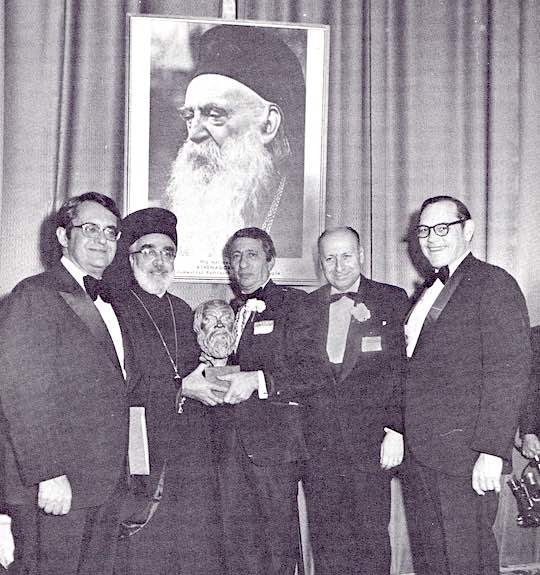
1972 AHEPA Socratic Award
Posing before an enlarged photo of His Holiness Patriarch Athenagoras I, Ecumenical Patriarch, who was the recipient of the 1972 Ahepa Socratic Award are (left to right): U. S. Secretary of Commerce Peter G. Peterson, His Eminence Archbishop Iakovos and Supreme President Sam Nakis holding the Socratic Award bust, His Excellency Dimitrios Tsakonas, Foreign Undersecretary of Greece, and U. S. Senator Robert Taft, Jr.
The 1972 AHEPA Socrates Award marked the first ever that a religious figure was honored by the AHEPA. It began a long tradition of honoring members of the clergy for their work, together with the AHEPA for the promotion of our Greek communities in the United States and abroad.
The 20th National Banquet honoring the U.S. Congress was held in Washington, D.C. on March 13, and His Holiness Athenagoras I, Ecumenical Patriarch of Constantinople, spiritual leader of Eastern Orthodoxy, was named the recipient of the 1972 Ahepa Socratic Award in recognition of 18 years as Archbishop of the Greek Orthodox Church of North and South America, and 24 years as Ecumenical Patriarch.
Although unable to attend due to physical health and age, the award was received on his behalf by His Eminence Archbishop Iakovos of the Greek Orthodox Church of North and South America.
The United States Senate & House of Representatives - 1976
To commemorate the Bicentennial anniversary of the founding of the United States, the Order of AHEPA presented the 1976 Socrates Award to all members of the United States Senate and the United States House of Representatives at the 22nd AHEPA National Banquet. The members of the Supreme and Grand Lodges of the AHEPA Family bestowed the honor on Congress en masse to express the gratitude of the Hellenic people for the great services rendered by all the legislators on Capitol Hill.
Although the AHEPA Established the Socrates Award to be awarded to a person deemed worthy, it was felt that on the 200th anniversary of the birth of the United States, it was only fitting that the United States Congress be honored for its support of Greece throughout her trials and tribulations.
Vice President Hubert H. Humphrey - 1978
The Socrates Award for 1978 was awarded posthumously to the late Vice President Hubert H. Humphrey at the 23rd Biennial Banquet. The award was presented to Mrs. Muriel Humphrey. In her response, Mrs. Humphrey stated that it was a great honor for her to accept the award for her husband. She said she was so proud on October 4, 1948, when her husband joined the Minneapolis Chapter of AHEPA.
Senator Claiborne Pell - 1982
United States Senator Claiborne Pell received the 1982 Socratic Award at the 15th Biennial Banquet. "I think it may be of some interest to you why an old New England Yankee became such a Philhellene," Senator Pell told the gathering.
Senator Pell continued:
"Well, I think there are several reasons – all rather emotional ones. I think Greece means different things to different people. It brings back memories of sailing in a kayak in the Aegean, being buffeted by the Meltemi, and seeing people on the Acropolis admiring the Parthenon. Now those of us who love Greece always have certain ambitions for it. We want to see a Greece that's at peace and that's prosperous, that doesn't have to worry whether the troops are on the northern flank or on the eastern flank, but where peace remains. We want to see a Cyprus where Turkish soldiers are no more, particularly when we bear in mind that all the weapons they carry are American weapons in defiance of American law, but with no punishment to the Turks for doing it, not even a tap on the wrist."
Bob Hope - 1984
Entertainer Bob Hope was the 1984 recipient of the Socratic Award at the 16th Biennial Banquet. Hope told more than 1,800 guests that AHEPA should give the Socratic Award to President Reagan, "I think that's appropriate, considering he knew Socrates personally."
"I owe an awful lot to the Greeks," he said. "If it weren't for mythology, I'd never be able to fill out my tax return. I was just thinking during the dinner, Greece invented democracy, and America is what helped it grow."
"What can I tell you?" Hope said. "You know, I appreciate this award, and I'm grateful just to be this year's recipient of this coveted Socrates Award. Talk about Greeks bearing gifts! Coming from this organization, a group that has done so much for so many people, it's significance is all the more meaningful and I'm deeply honored. I'll cherish it. It's going to hold a very, very high spot in my trophy room and my heart. Thank you very much."
President Ronald Reagan - 1986
The 1986 recipient of AHEPA's highest award was President Ronald Reagan. President Reagan represented a time of nostalgia and remembrance for the AHEPA. The Order believed that the President espoused the best our country could do for the entire world. For this reason, AHEPA chose President Reagan.
Archbishop Iakovos, Primate of the Greek Orthodox Church of North & South America - 1988
Archbishop Iakovos was the 1988 recipient of the Socratic Award at the 28th Biennial National Banquet. In his acceptance speech, Archbishop Iakovos said:
In my wildest dreams I never thought that I would be receiving an award from the Order of AHEPA. First, because I am not a person that must anticipate awards. For a clergyman there is one reward: to respond to the dictates of his conscience, to follow steadfastly in the footprints of the Saints of the Church, and, above all, his Master's.
The Socrates Award should be given to the founders, leaders and members of the AHEPA who have departed from this world because they were the ones who gave us the great blessing of Greekness, of identity, of Orthodoxy, and of integrity. The founders of the AHEPA are to be ever respected by all of us for they, ahead of their time, in 1922 found it possible to believe that the ideals of AHEPA could be perpetuated among the generations to come. He who writes the history of AHEPA must place the emphasis where it belongs – the Ahepans have been the inheritors of the great ancient Greek legacy and the ones who were able to instill and implant those values in the hearts of their children and grandchildren.
I humbly accept this gracious award on behalf of all of you who have labored year after year so that the legacy of the ancient Greek spirit may be carried on courageously, committedly, lovingly, and dedicatedly.
President George H.W. Bush - 1990
AHEPA was extremely honored by President Bush's 1,000 points of light speech where he mentioned the Order of AHEPA. In recognition for his extraordinary efforts in the Gulf War and for his steadfast support of what was right and just. President George Bush was awarded this honor in 1990.
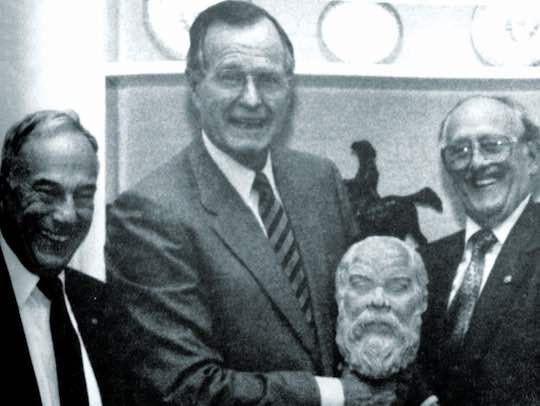
President George H.W. Bush
The Order of AHEPA presenting President Bush with the AHEPA Socrates Award in the Oval Office.
President Bush exemplified a lifetime of service to America as a World War Two combat pilot and during his tenure in public service. However, AHEPA will always remember him for making the call to public and community service a centerpiece of his life. In his 1988 acceptance speech for the Presidential nomination at the Republican National Convention in New Orleans, then Vice President Bush cited the Order of AHEPA as one of the 'Thousand Points of Light' that brighten and diversify America through a 'Nation of Community.'
Lt. General William "Gus" Pagonis - 1992
Awarded in 1992 at the AHEPA Congressional Banquet. His service and logistics during the Desert Storm assisted in securing a swift and decisive victory for the United States and their allies.
Dr. Mary Matthews - 1992
Philanthropist Dr. Mary Matthews was awarded the Socrates award. For her unselfish service to her community and support of institutes of higher learning, Dr. Matthews was singled out for her support of Greek American studies and her family's staunch support of the United States. Dr. Matthews also donated $25,000 to the AHEPA.
Senator Paul Sarbanes - 1993
In 1993, the Order of AHEPA awarded United States Senator Paul Sarbanes of Maryland the Socrates award for his devotion and support of the Greek American community. At the time, Senator Sarbanes was America's highest elected official of Greek descent.
In acceptance, Senator Sarbanes quoted Classicist and Author Edith Hamilton's observation on Greeks: "Freedom was a Greek discovery. The Greeks were the first free nation in the world. Greece rose because there was in the Greeks the greatest spirit that moves in humanity &ellips; the spirit that makes men free."
Senator Sarbanes added:
"It is the high standards of AHEPA which makes this Socratic Award a great honor which I receive with pride and gratitude and humility. But more importantly which I accept, in tribute and in honor of that courageous immigrant generation, my parents, who came to a new land to create opportunities for their children, in belief that if they gave them freedom, they would put it to good use."
In 1970, Paul Spyros Sarbanes became the fifth American of Greek descent elected to the United States Congress representing the Fourth District of Maryland. He was born in Salisbury, Maryland on February 3, 1933, and his parents, Spyros and Matina Sarbanes, were immigrants from Greece. He graduated from Princeton University in 1954, magna cum laude and Phi Beta Kappa. He was a Rhodes Scholar at Balliol College, Oxford University, 1954-57, and received First Class B. A. Honors Degree in the School of Philosophy, Politics and Economics. He then attended Harvard Law School and received an LL.B. degree cum laude in June, 1960. Senator Paul Sarbanes is a life member of AHEPA.
President William J. Clinton - 1996
1996 had the Socrates award back in the White House. After several years, the award was once again given to the highest elected official in the land.
Patriarch Bartholomew I - His All Holiness, Bartholomew I, Archbishop of Constantinople, New Rome & Ecumenical Patriarch - 1997
In 1997 the Socrates Award was given to the Ecumenical Patriarch. Awarded in the United Stated during his first official visit, the Patriarch was honored with a banquet in Washington, where 500 AHEPANs from across the country came to be with his Holiness. Supreme President Steve Manta was honored when he spoke about the importance of this function.
President George W. Bush - 2002
The President of the United States was once again the man in the spotlight in 2002. After the devastating events of 9/11 the country rallied behind the President and he represented all Americans in their greatest test of patriotism and need.
Tassos Papadopoulos, President of Cyprus - 2007
The Socrates Award for 2007 was awarded to Tassos Papadopoulos, the President of Cyprus, for his efforts in fighting for Greek Cypriots as well as overseeing Cyprus' entrance into the European Union.
Costas Karamanlis, Prime Minister of Greece - 2007
Costas Karamanlis, Prime Minister of Greece, was honored with the AHEPA Socrates Award in 2007 in recognition of his commitment to Hellenism and the Hellenic Republic. He personally thanked the Order of AHEPA for the support the organization has given to Greece and gladly accepted the honor bestowed on him.
George Kalogridis - 2014
The President of Walt Disney World Resort, George Kalogridis, was honored by AHEPA in 2014 for his commitment to guest services and hospitality. Upon accepting his award, Kalogridis addressed the banquet audience by saying "I stand before you both as a son of America and a son of Greece," and went on to speak about what Hellenism meant to him and what an honor it was to be bestowed with such a high honor by AHEPA.
John Boehner - 2015
Supreme President Phillip T. Frangos presented Speaker of the House of Representatives John Boehner with the 2015 Order of AHEPA Socrates Award on April 14, 2015. AHEPA honored Speaker Boehner for his fulfillment of the American Dream that saw him go from mopping floors and waiting tables at his family tavern, to working his way through college, to becoming a small business owner.
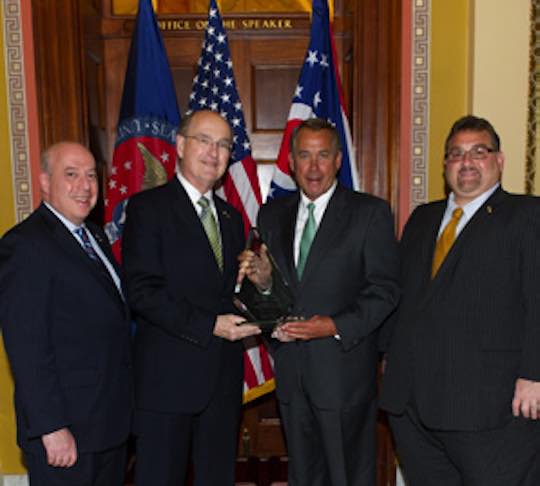
Speaker of the House John Boehner
Supreme Secretary Andy Zachariades and Executive Director Basil Mossaidis accompanied Supreme President Frangos to the award presentation held at the United States Capitol.
Eventually Speaker Boehner pursued public service and became the United States Representative from Ohio's Eighth Congressional District in 1990. He was elected the 53rd Speaker of the House on November 17, 2010 and re-elected to a third term in 2015.
Philip Christopher, President of the International Co-ordinating Committee "Justice for Cyprus" - 2019
Philip Christopher's relentless passion to see justice for Cyprus is immeasurable. As an advocate, Philip has set the benchmark to which all others aspire. We are proud to call him a Brother Ahepan, not just for his advocacy.
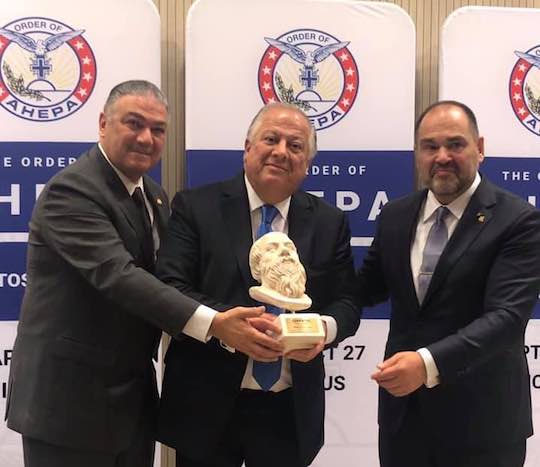
Philip Christopher
Supreme President George E. Loucas (R) and Chairman of the Board Nicholas A. Karacostas, PSP (L), present the
2019 AHEPA Socrates Award to Philip Christopher (C) for his fulfillment of the American Dream, for his vision, passion and determination
to see peace, love and justice prevail and reign over a united Cyprus, and for his unwavering support for
Hellenism and organizations such as AHEPA.
Philip Christopher embodies and exemplifies why AHEPA was founded nearly 100 years ago. He immigrated to the United States at the age of 10. Through a hard work ethic and spirit of entrepreneurship, Philip's fulfillment of the American Dream ascended over a 30 year career to become a leader in the wireless industry – as President/CEO and Founder of American Network Solutions and serving on several trade association boards.
Michael Psaros, Co-Founder & Managing Partner of KPS Capital Parners - 2019
Upon receiving the Socrates Award for his achievements, Michael Psaros had the following to say about AHEPA:
I thank you for presenting me with the 23rd Socratic Award. I accept this extraordinary honor with humility and respect. I cannot comprehend that AHEPA has presented me with an honor bestowed to Ecumenical Patriarchs and Presidents of the United States. I dedicate this prestigious award to my family, to my parents, but above all, to my grandparents: που ειταν προτοποροι και μεταναστες – who were pioneers and immigrants. I dedicate this prestigious award to that generation.
I am proud to be an AHEPAN because AHEPA was originally created to defend those metatastes from discrimination. AHEPA was critical in helping the generations of metanastes assimilate. When they were in need, AHEPA answered the call. I am proud to be an AHEPAN, because it was created to promote Hellenism and the Hellenic ideal. Hellenism is God's gift to human civilization and represents the best of humanity: philotimo, philanthropia, philoxenia and agape. Central to Hellenism is the primacy of the individual in society, of free will, of free choice, of free expression, of free action. These values form the foundation of this Republic.
Additionally, Michael Psaros praised The Order of AHEPA's philanthropy and commitment to their mission.
